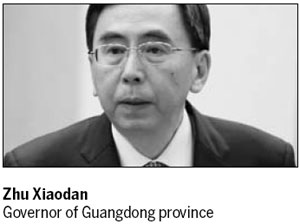

Guangdong province has reduced its dependence on foreign trade and will continue expanding domestic demand and optimizing the composition of investments to achieve sustainable economic development, its governor said.
"Guangdong may be the most dependent on foreign trade among all the provinces and regions in China. However, it is unsustainable to rely solely on exports to generate economic growth," said Guangdong Governor Zhu Xiaodan.

Zhu noted that transactions at this year's autumn session of the Canton Fair dropped compared with the spring session, as well as last autumn's session.
"The declines show that uncertainties about the rebound of the global economy persist, and downward pressure on Guangdong's foreign trade hasn't fundamentally eased," Zhu commented on the sidelines of the 2013 International Consultative Conference on the Future Economic Development of Guangdong Province.
To maintain steady growth after the global downturn in 2008, Guangdong turned to expanding consumption.
"Guangdong's economy is in a transition period, with its dependence on foreign trade declining. The decline is directly related to a lack of external demand.
"But at the same time, consumption and investment have gained strength as driving forces for economic growth," Zhu said.
The governor promised that Guangdong will make new efforts to ensure that consumption plays a bigger role in boosting local GDP growth.
"On the one hand, we will strengthen consumers' purchasing power by making sure that urban and rural incomes grow faster than the economy.
"On the other hand, we need to cultivate new points of growth to further expand consumption," Zhu said.
The significant growth in investment, whose contribution to the province's GDP doubled from 2007 to 2012, did much to maintain steady economic growth.
Investment will continue to grow rapidly in the coming years, said Chen Hongyu, professor of economics at the Party school of Guangdong and a counselor for the provincial government.
"Guangdong's government is investing a lot to improve the infrastructure of the undeveloped northern, eastern and western parts of the province, especially transportation facilities.
"The improvements are necessary, taking the province's long-term development as a whole into consideration," Chen said.
Zhu said that by 2015, as much as 1.48 trillion yuan ($240 billion) will be spent to build high-speed, intercity and urban rail transit systems, highway networks and port and shipping systems.
Those projects will help the province realize the 12th Five-Year Plan (2011-15) goal of expanding the transportation network to cover every county in the province.
"Guangdong's investment in fixed assets has been lagging that of other provinces, so the big increase ... is not excessive," Chen said.
"However, the government needs to optimize the structure of investments to maintain steady growth after the infrastructure projects are completed," Chen added.
"The government should increase investment in the real economy such as emerging industries and industrial parks in the northern, eastern and western areas of the province. Investment is still concentrated in such areas as real estate," Chen said.
"Investors should also be more diversified. Projects concerning infrastructure, industrial parks and finance should be further open to private investment without being dominated by the government and State-owned enterprises."
 Volvo all-new S60L world premiere at Guangzhou auto show
Volvo all-new S60L world premiere at Guangzhou auto show
 Largest span timber arch bridge
Largest span timber arch bridge
 Porsche 911 Turbo S Asian premiere fascinates Auto Guangzhou
Porsche 911 Turbo S Asian premiere fascinates Auto Guangzhou
 Auto Guangzhou witnesses new Porsche sports cars Asia Premiere
Auto Guangzhou witnesses new Porsche sports cars Asia Premiere
 2013 Guangzhou auto show carmakers' eventers
2013 Guangzhou auto show carmakers' eventers
 Models at Volvo pavilion at 2013 Guangzhou auto show
Models at Volvo pavilion at 2013 Guangzhou auto show
 Lexus new hybrid hatch CT200h world premiere in Guangzhou
Lexus new hybrid hatch CT200h world premiere in Guangzhou
 New C-X17 showcases Jaguar's crossover concept
New C-X17 showcases Jaguar's crossover concept